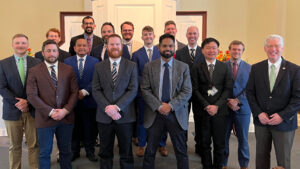“What do you want to be when you grow up?” It’s a question that people begin asking you around the age of 5 and that will haunt you until adulthood, when it changes into, “Where do you see yourself in five years?”
For a Christian the general answer should always be, “More like Jesus than I am today.” The specific answer, though, depends on our vocation, the specific way in which God calls us to live as a Christian in the world and serve our neighbor.
Because our occupations are one of our key vocations and one of the primary ways we serve our neighbors, what we do as a job or career plays a formative role in the type of Christian we will become.
Most people, though, believe the path their career takes are largely out of their control and significantly influenced by chance events. This has lead to the development of what Jim Bright calls the “chaos theory of career development.”
Joseph’s Unpredictable Path
In mathematics, chaos theory is the idea that the present determines the future, just not necessarily in a way that we can predict. A system like the weather may be predictable for a while and then appears to become random. Bright explains,
Like the weather, we might be able to predict what’s going to happen [in our careers] tomorrow or the day after, but as the time horizons moves out to weeks or months or years then it becomes next to impossible to make predictions.
Vocational researchers examining “chaos theory” tend to emphasize not the consistent, orderly nature of career patterns, but rather the importance of initial conditions and the effect of seemingly random perturbations on career development, that somewhat disrupt the ultimate trajectory of individual careers.
A prime example is the story of Joseph. If you had asked him as a boy what he wanted to be when he grew up, Joseph likely would have answered he wanted to a shepherd, like his brothers. He could have never foreseen the path his life—and his career—would eventually follow because of what would have seemed like “random perturbations.”
Joseph certainly couldn’t have predicted he’d become the highest official in Egypt, second in power and authority only to Pharaoh. Yet later in life he recognized, as he told his brothers, that, “God intended [all that had happened] for good to accomplish what is now being done, the saving of many lives” (Gen. 50:19).
Skillset and Mindset
Like Joseph, we may not necessarily be able to control the trajectory of our vocations, but we can influence the initial conditions. Two factors you can influence that can be significant for vocational development are your skillset and your mindset.
God has given you particular interests, aptitudes, and abilities for a reason. While you may not yet know the reason, you can prepare by developing skills related to those areas. The skillsets you acquire, even more than your vocational preferences, will often determine what work is available to you and how God can use you. Choose skill clusters carefully, for they will have a significant effect on the path your career takes.
“You have no idea where you are going, or when the trip will begin.” That’s the title of the first chapter of Hugh Hewitt’s invaluable guide, In But Not Of: A Guide to Christian Ambition and the Desire to Influence the World. As Hewitt says, “Your circumstances today may or may not be particularly promising, but circumstances change, sometimes slowly and sometimes in the space of a day.” The example he gives is that at the age of 40, Alexander Solzhenitsyn was teaching math, Karol Wolitya (Pope John Paul II) was an obscure bishop in Poland, and Ronald Reagan was a washed-up B-movie actor. Yet all three would eventually play a role in bringing down the Soviet Union and freeing millions from tyranny.
Like Joseph, we don’t know where our lives will lead, which means we must be ready for whatever comes. Prepare for your calling, rather than your career.
Above all, remember that while you cannot be anything you want to be, you can be anything God wants you to be. He’s given you skills and interests and opportunities that will allow you—if you seek his guidance by reading his Word and obeying his commands—to find your calling.
Trust God and step out boldly. If you faithfully follow the vocational path he has prepared for you, you’ll likely have an exciting and unpredictable journey ahead of you. Our Creator clearly sees your path—even if from your current, limited perspective it may look like chaos.


































